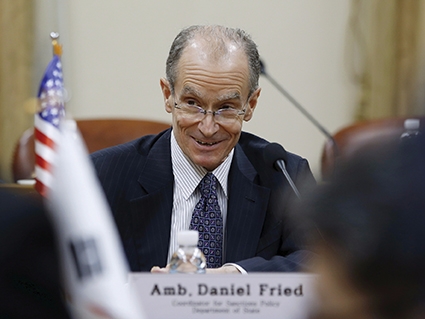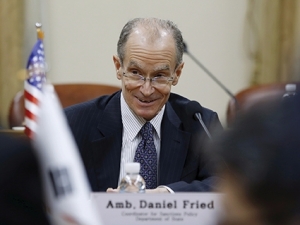The Longest Serving US Diplomat & His Vision of a New Free World
After 40 years in Foreign Service, Ambassador Daniel Fried retired from the State Department as the longest serving diplomat and joined the DC-based Atlantic Council. Fried, who oversaw the first phase of the Russia sanctions and worked on NATO enlargement, published an essay recently, in which he describes the modern understanding of the Free World, its implications, and US foreign policy.
Voice of America’s Nana Sajaia sat down with the Ambassador to discuss, what he calls America’s “Grand Strategy” in the age of Russia’s “corrosive politics”.
A bipartisan group of Senators agreed on a list of new sanctions to punish Russia for meddling in the 2016 presidential election. Who oversaw the 1st round of sanctions? Are additional sanctions the best way for Washington to navigate its relationship with Moscow?
I understand what the senators are after and I appreciate their commitment to holding Russia accountable for its aggression against Ukraine, not forgetting its aggression against Georgia in 2008, and its aggression directly against the United States with the cyber hacking of our elections. The senators are trying to do something, which is important and difficult.
We do want to cooperate with Russia where we have common interests, and I am all for that. But we should neither expect too much from the Russians, nor should we, under any circumstances, pay Russia in advance with other countries’ equities for the privilege of working with them on areas that are supposed to be of common interest.
In your recent essay, you speak about the Free World…
The Free World is a collection of those countries committed to a rule-based world, rule of law at home, democracy, and sharing a belief that the great democracies should work together to make the world a better place, which will also be better for their countries.
Against the values of the Free World we have the notion of autocracies, the great dictators, who want to make the world in their own image, not a rule-based one, but a world where power is its own rationale and its own justification; a world of spheres of influence. In that world, a country like Georgia has no genuine sovereignty, but is merely a product of some great powers’ interest and game.
To put it bluntly, in a sphere of influence world, a world run by the great autocracies, Georgia belongs to some other power. In the Free World, Georgia belongs to itself and its faith is up to Georgians.
You also speak about the Free World-based US foreign policy. How would you define that to the democracies in Eastern Europe that you have worked on for decades?
According to the tenants of the Free World, the countries that emerged from the Soviet Union, as they build their democracy and economies and strong institutions at home, have every right to join with the great institutions of the transatlantic world.
We made great progress on that for almost 20 years following the end of the Iron Curtain. We didn’t complete that task and Georgians would probably say, hey, what about us? Are we less deserving? And the answer is, you are equally deserving, you deserve to find your place in greater Europe based on what you do at home and not on what Moscow will let you do.
Sometimes, history does not work out simply and that time for Georgia may come again. It might not be now, but it will come again.
You argue that America is stronger when it works with allies and not when it recognizes spheres of influence. However, the 2008 Georgia-Russian war was an example of recognizing spheres of influence for many
It is a fair question to ask. After 1989, for 20 years, we had great success helping countries like Poland, the Baltic States and Romania to join the institutions of Europe and the transatlantic community. We tried with Georgia in Bucharest and we almost succeeded. I’m not going to pretend otherwise: we did not succeed and then the war happened and the West was divided, but that does not mean we recognize spheres of influence over Georgia. What it means is that we have to be realistic about what is possible right now in this phase of history; it does not mean history is closed for Georgia.
Interview originally published here: https://www.amerikiskhma.com/a/interview-with-daniel-fried/3906364.html
Nana Sajaia, Voice of America Georgian Service












